Copperfingertips - Represent The Human Race

More Posts from Copperfingertips and Others
shopping responsibly
this is a sequel to my other post about alternatives to throwing things away. that post detailed some ways to reduce your waste, but the production, shipping, handling & transportation of new items can also be extremely wasteful & push costs up. obviously there’s no ethical consumption under capitalism & you aren’t a bad person for being unable to “shop ethically,” but some of these ideas can help with personal consumption. here are some tips about purchasing or acquiring goods with minimum environmental impact or just minimal financial impact.
ask around: ask your friends & neighbors if they have the desired item(s) that they are no longer using. this can be handy for most nonperishable goods, especially if you have a cooperative community. the free section of craigslist in your area is a good place to start, or the free section of the nextdoor app; you can also put up an advertisement in nextdoor or a similar app to ask if anyone has what you’re looking for & is willing to give it away.
thrift stores: good for clothing, furniture, & other things. it’s fairly easy to find a local thrift store online, & you never know what kind of treasures are there.
do your research before donating unwanted goods: some thrift stores that depend on donations will give out discounts to donators. you can use this on your next purchase at the store.
reselling sites: if you’re on the hunt for something more specific/that you prefer to be unused (such as makeup), people list all kinds of unwanted gifts & random things on resale sites. ebay is the most famous example, but poshmark, mercari & depop are all more fashion-focused places to get trends at a discount & without directly paying a corporation. thredup is the equivalent of an online thrift store, with more emphasis on basic/classic/affordable pieces. also, check out facebook for sale/trade groups in your area!
farmer’s markets: perfect for local produce. you support small businesses & get food that’s full of fewer artificial additives! warning, though: these can be pricey.
borrowing & renting: if you’re not going to need it forever, then don’t pay a forever price! often local hardware stores have tool rentals, for instance.
barter: trade something you don’t need for something you do. this can easily be another “ask around” one, but there are some websites specifically for swapping makeup, clothes, & more.
local artisans/stores: in the event that you absolutely NEED to buy something new, try getting it handmade or local. etsy is a good online marketplace for handmade goods, & some areas have their own sites/directories. ask around!
make it yourself/repair something: if you need something that you can create on your own (especially from reused materials), then just do it. see if you have a local makerspace, where you can access tools & assistance.
reuse: see if you have anything that would do the job, even if it’s not conventional. as long as it’s safe, you can do some WEIRD substitutions.
reduce: the classic solution, which is just not getting anything new. do you REALLY need another tube of lipstick? more shoes? your 5th jacket this season? i thought not!
edit: dumpster diving & curb picking are valid options as well. you might want to look into the legality of this in your area, but if you’re not afraid of getting your hands dirty it’s great. people throw away things that are still useable ALL the time.
this post isn’t exhaustive, so PLEASE add any websites or ideas that you might have! good luck!!

“This is my first cabbage! You know, a lot of times they’re kind of soft, but this one is solid! It’s going to be good eatin’!“ “What are you going to make with it?” “Well, this one I’m giving to my parents. You have to give the first one away or you just spoil the whole spirit of gardening.”



We have the right to good jobs and a liveable future.
Lunarpunk Futures
All digital media is free to download and access by all even academic journals. But that doesn’t stop you from getting physical copies of your most cherished books on your shelves.
Study sessions and debates that bleed into the early morning hours at cafe’s with friends about philosophy, politics, and religious thought when your not engaged in actual study for one of your chose degree paths which are all free at your local university and online.
Late nights spent among strangers with telescopes pointing out the stars and learning their names.
Hacked fabric printers to print customized clothing in any size, shape, color, or pattern required. Need a skirt that looks good in a wheelchair? Check. Need a religious article of clothing? Check. Wanna change that to a bamboo silk instead of cotton? Check. Wanna put your own touches and designs on a pre-made base? Done.
Multilingualism is the norm and there are meetups to learn and share languages with each other.
Tablets that have great internal storage capabilities as well as settings for every language, blue light filtering, captions, font changes for dyslexia, dark mode, and more all built in by default.
Voting has taken on a whole new meaning with debates about the benefits or problems with bills, elections, etc. Voting is done regularly and with more public participation than ever before.
Every person has a guaranteed income that is above the poverty lines of the past, increases over time, and housing and healthcare are guaranteed.
Solar lanterns in tea gardens late at night listening to splash of koi fish while reading Basho.
Accessibility is built in by design in every building, walkway, path, etc. with bioluminescent lighting as needed.
Every home and apartment grows their own herbs, fruit trees hang over bioluminescent permeable sidewalks, and wild permaculture gardens are in every backyard.
Grocery stores contain zero advertising, offer delivery if needed, biodegradable and plastic free. Everything is designed to be recyclable or returned to nature is a beneficial way.
Rules on light and sound pollution preserve natural biological systems and keep wildlife stress to a minimum. Public transportation is the norm, there are still bicycles, electric mopeds, and wheelchair accessible self-driving taxis.
There is an online veggie trading system that allocates veggies to those who need them from those who have too many.
University is open to everyone and lifelong learning is emphasized. Emphasis is on learning and understanding topics not passing exams.
There are libraries, water bottling refilling stations, and green-spaces are the default.
*That’s all for now, I’ve currently got a cold and can’t think of anything else atm. I’ll try to keep posting things like this in the future though. :)
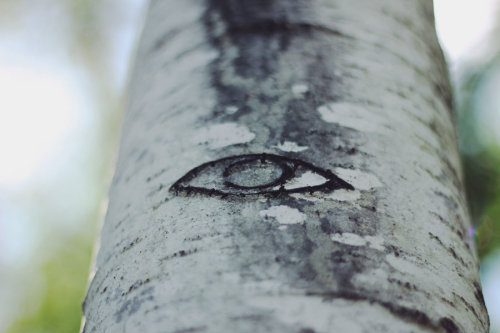
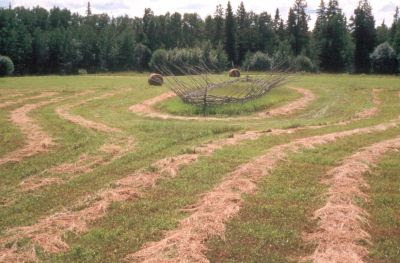
By copyrighting his property as an artwork, he has prevented oil companies from drilling on it.
Peter Von Tiesenhausen has developed artworks all over his property in northern Alberta. There’s a boat woven from sticks that is gradually being reclaimed by the land; there is a fence that he adds to each year of his life, and there are many “watching” trees, with eyes scored into their bark.
Oil interests pester him continually about drilling on his land. His repeated rebuffing of their advances lead them to move toward arbitration. They made it very clear that he only owned the top 6 inches of soil, and they had rights to anything underneath. He then, off the top of his head, threatened them that he would sue damages if they disturbed his 6 inches, for the entire property is an artwork. Any disturbance would compromise the work, and he would sue.
Immediately after that meeting, he called a lawyer (who is also an art collector) and asked if his intuitive threat would actually hold legally. The lawyer visited, saw the scope of the work on the property, and wrote a document protecting the artwork.
The oil companies have kept their distance ever since.
This is but one example of Peter’s ability to negotiate quickly on his feet, and to find solutions that defy expectations.
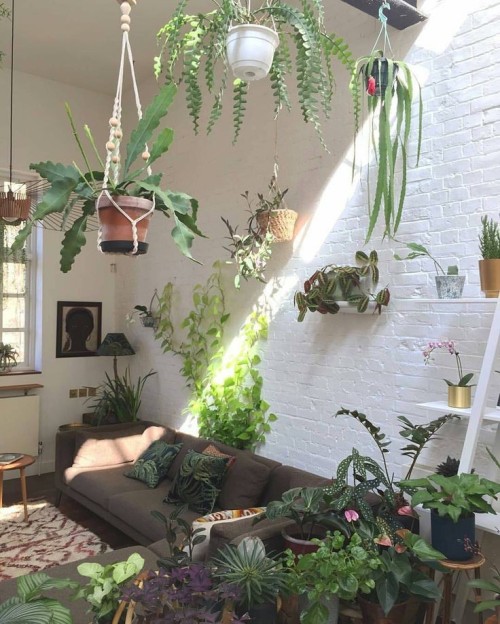
Giethoorn in Netherlands has no roads or any modern transportation at all, only canals. Well, and 176 bridges too. Tourists have to leave their cars outside of the village and travel here by foot or boat by. So you can probably imagine how peaceful it is here.









Everyone should garden
Sometimes when I’m talking to people about sustainability they’re like, “well, not everyone wants to garden” and it’s like, on the one hand I’m sure that’s true because of the diversity of the human experience means that someone out there would hate gardening no matter what.
But on the other hand…. what???? Why would someone NOT want to experience the miracle of life and then have the freshest ingredients possible to cook with??? All while releasing no green house gasses and being super cheap???
Humans have literally lived forever surrounded by plants with cultivating plants as a vital part of how we have lived for thousands of years and you’re telling me that we should stop doing that because some people don’t like to garden??
Gardening isn’t a hobby! It’s a way of life that we all need to be living if we can because our current way of life is unsustainable! Also everyone that can garden should so we can support the people who can’t. Gardening is what made us human and we can’t stop now.



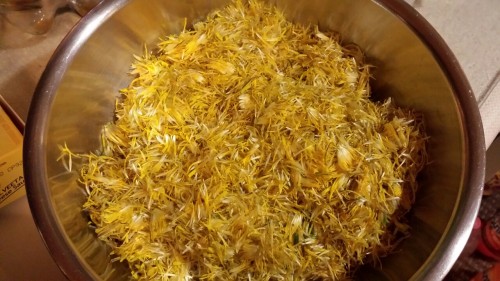
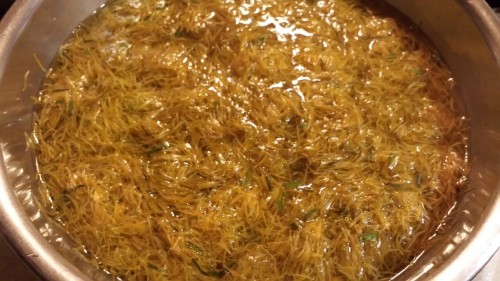
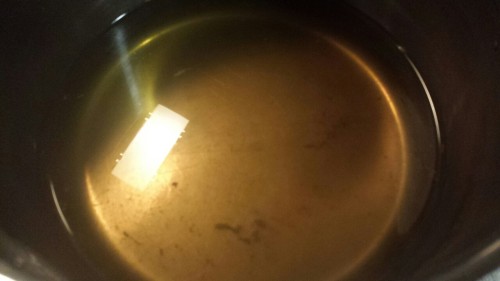

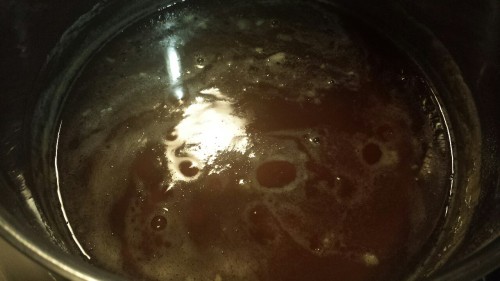
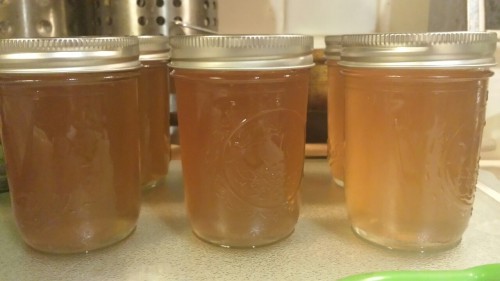
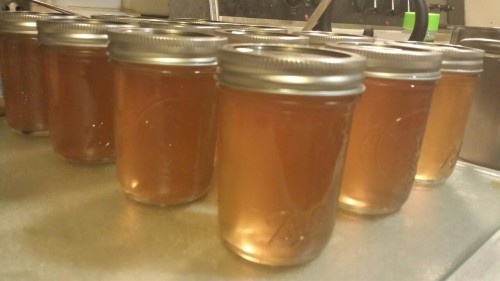
DANDELION JELLY! !! It tastes like honey! 🐝🐝🐝🐝🐝🐝🐝🐝🐝🐝🐝 been a busy bee last few days harvesting flowers, plucking petals, extracting nectar, straining and canning this delicious jelly! Very Tideaous work but it’s worth it!
3 cups dandelion tea (made from 4 cups of petals in boiled water overnight ) 4 cups of sugar 2 tbsp fresh lemon juice 6 tbsp of regular ball fruit pectin Water bath can for 10 minutes Makes 6 - ½ pints
4/20/16
-
 felixlefebvre liked this · 1 year ago
felixlefebvre liked this · 1 year ago -
 monstergili liked this · 1 year ago
monstergili liked this · 1 year ago -
 theatramentous liked this · 2 years ago
theatramentous liked this · 2 years ago -
 the-dream-verse reblogged this · 2 years ago
the-dream-verse reblogged this · 2 years ago -
 moonstonemoonlight liked this · 3 years ago
moonstonemoonlight liked this · 3 years ago -
 jawbone-xylophone reblogged this · 3 years ago
jawbone-xylophone reblogged this · 3 years ago -
 infamousrunawayxnginxxr liked this · 3 years ago
infamousrunawayxnginxxr liked this · 3 years ago -
 idi-ymira-blog liked this · 3 years ago
idi-ymira-blog liked this · 3 years ago -
 moonheart-sunstar liked this · 3 years ago
moonheart-sunstar liked this · 3 years ago -
 bagginshieldhappiness liked this · 3 years ago
bagginshieldhappiness liked this · 3 years ago -
 ladyburgundy liked this · 3 years ago
ladyburgundy liked this · 3 years ago -
 santiagoserranorocha liked this · 3 years ago
santiagoserranorocha liked this · 3 years ago -
 pinkmoos reblogged this · 4 years ago
pinkmoos reblogged this · 4 years ago -
 pinkmoos liked this · 4 years ago
pinkmoos liked this · 4 years ago -
 larklatroy liked this · 4 years ago
larklatroy liked this · 4 years ago -
 i-am-moonknight reblogged this · 4 years ago
i-am-moonknight reblogged this · 4 years ago -
 ink-the-crow liked this · 4 years ago
ink-the-crow liked this · 4 years ago -
 i-am-moonknight liked this · 4 years ago
i-am-moonknight liked this · 4 years ago -
 captain--quirk liked this · 4 years ago
captain--quirk liked this · 4 years ago -
 means-few-ends-none reblogged this · 4 years ago
means-few-ends-none reblogged this · 4 years ago -
 40001-goblins liked this · 4 years ago
40001-goblins liked this · 4 years ago -
 peaceloveandmonsters liked this · 4 years ago
peaceloveandmonsters liked this · 4 years ago -
 siryl reblogged this · 4 years ago
siryl reblogged this · 4 years ago -
 hyzenthlayli liked this · 4 years ago
hyzenthlayli liked this · 4 years ago -
 batsandflowers reblogged this · 4 years ago
batsandflowers reblogged this · 4 years ago -
 batsandflowers liked this · 4 years ago
batsandflowers liked this · 4 years ago -
 song-system liked this · 4 years ago
song-system liked this · 4 years ago -
 grptoast liked this · 4 years ago
grptoast liked this · 4 years ago -
 sendmegayinceststuff reblogged this · 4 years ago
sendmegayinceststuff reblogged this · 4 years ago -
 neighborhoodcrow liked this · 4 years ago
neighborhoodcrow liked this · 4 years ago -
 afroditekillsdemons liked this · 4 years ago
afroditekillsdemons liked this · 4 years ago -
 bloomeuphoria liked this · 4 years ago
bloomeuphoria liked this · 4 years ago -
 alexresides liked this · 4 years ago
alexresides liked this · 4 years ago -
 optimisticfutures reblogged this · 4 years ago
optimisticfutures reblogged this · 4 years ago -
 cumlord101 liked this · 4 years ago
cumlord101 liked this · 4 years ago -
 plantsncrafts reblogged this · 4 years ago
plantsncrafts reblogged this · 4 years ago -
 asushunamir2051 reblogged this · 5 years ago
asushunamir2051 reblogged this · 5 years ago -
 perringwrites liked this · 5 years ago
perringwrites liked this · 5 years ago -
 emlynblack liked this · 5 years ago
emlynblack liked this · 5 years ago -
 wanjasworstweb reblogged this · 5 years ago
wanjasworstweb reblogged this · 5 years ago -
 wanjasworstweb liked this · 5 years ago
wanjasworstweb liked this · 5 years ago -
 dude-imsotired liked this · 5 years ago
dude-imsotired liked this · 5 years ago -
 starryeyedbitchh reblogged this · 5 years ago
starryeyedbitchh reblogged this · 5 years ago